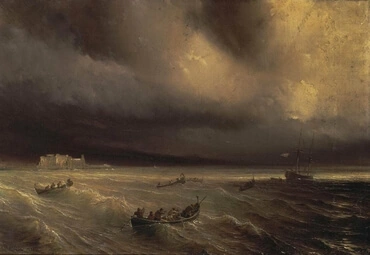8286. 'And with the wind of Your nostrils the waters were heaped up' means falsities gathered together through heaven's presence. This is clear from the meaning of 'the wind of Your nostrils' as heaven, dealt with below; from the meaning of 'being heaped up' as being gathered into one; and from the meaning of 'the waters' as falsities, dealt with in 7307, 8137, 8138. Damnation and being cast into hell involves having all the falsities arising from evil gathered together, and then being hemmed in by them, see 8146, 8210, 8232; and this happens as a result simply of the Lord's presence, 8265. The reason why 'the wind of Jehovah's, or the Lord's, nostrils' means heaven is that the expression is used to denote the breath of life, that is, God's life; and since God's life constitutes heaven's life, heaven is meant by 'the wind of Jehovah's nostrils'. This also explains why the same word in the original language means both wind and spirit.
[2] The fact that Jehovah's wind or His breath means heaven's life, and the life of a person in heaven, that is, of one who has been regenerated, is clear in David,
By the Word of Jehovah were the heavens made, and all their host by the spirit (wind) of His mouth. Psalms 33:6.
In the same author,
You gather up their spirit, they breathe their last and fall back into their dust. You send forth Your spirit (wind), they are created. Psalms 104:29-30.
In Ezekiel,
Jehovah said to me, Will these bones live? Then He said, Prophesy over the spirit, prophesy, O son of man, and say to the wind, Thus said the Lord Jehovih, Come from the four winds, O spirit, and breathe into these killed, that they may live. And the spirit came into them, and they lived again. Ezekiel 37:3, 9-10.
In John,
I saw four angels standing over the four corners of the earth, holding back the four winds of the earth, in order that the wind should not blow onto the earth, nor onto the sea, nor onto any tree. Revelation 7:1.
Here 'the wind' stands for heaven's life, which is God's life, as also in Job,
The spirit of God has made me, and the breath of Shaddai 1
has given me life. Job 33:4.
[3] Since 'wind' meant life the Lord also says, in His teaching about a person's regeneration,
The spirit (or wind) blows where it wishes, and you hear the sound of it, but you do not know where it comes from or goes away to; so it is with everyone who has been born from the spirit. John 3:8.
And since life from God was meant by 'Jehovah's wind' or 'His breath' it therefore says of Jehovah, when Adam's new life is the subject, that
He breathed into his nostrils the breath of life; and man became a living soul. Genesis 2:7.
The word 'nostrils' is used because a person breathes by means of them and by means of breathing has life, as in Isaiah,
Turn yourselves away from the person in whose nostrils there is breath. 2
Isaiah 2:22.
In Jeremiah,
The Breath 3
Lamentations 4:20Job 27:3.
[4] Since therefore 'the wind of Jehovah's nostrils' means life which comes from the Lord, and so in the universal sense means heaven, and since through the Lord's presence - or through the presence of heaven, where the Lord is - evils and falsities are cast into hell, 8265, so also is the accomplishment of this meant by 'the wind of Jehovah's nostrils', as in David,
The channels of the sea were seen, the foundations of the world were revealed, because of Jehovah's rebuke, at the blast of breath from His nostrils. 4
Psalms 18:8, 15; 2 Samuel 22:16. 5
In Isaiah,
The breath of Jehovah like a stream 6
of brimstone sets it alight. Isaiah 30:33.
In the same prophet,
Indeed they are not planted, indeed they are not sown, indeed their trunk does not take root in the earth, and also He breathes onto them and they wither, so that the whirlwind may bear them away like stubble. Isaiah 40:24Psalms 147:1718
In addition this explains why 'the nose', when used in reference to Jehovah or the Lord, also means wrath, and so the punishment, vastation, and damnation suffered by those ruled by evils and falsities, as in Numbers 25:4; Deuteronomy 7:4; Judges 2:14; Isaiah 9:12; Jeremiah 4:8Hosea 14:4; Psalms 6:1; 86:15; 103:8; 145:8; and very many other times elsewhere. It explains too why 'breathing with the nostrils' or 'breathing out' means being angry, Deuteronomy 4:21; Isaiah 12:1; Psalms 2:12; 6:1; 60:1; 79:5; 85:5.







